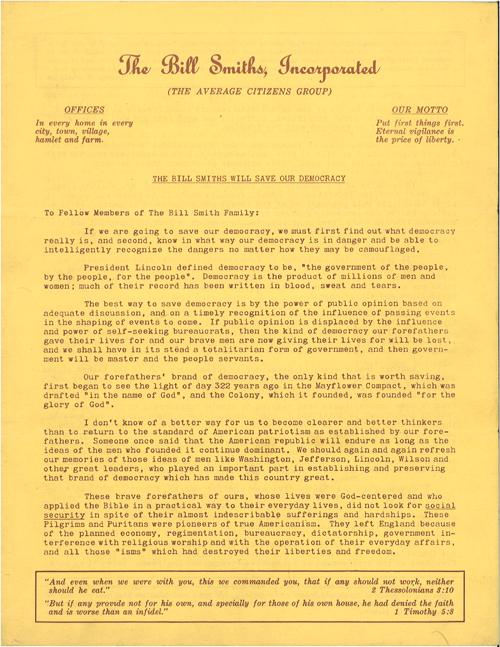

The Bill Smith Letters, by L.E. Faulkner

Written during World War II, the Bill Smith Letters are a series of letters composed to argue a particular position on what made up American democracy, and who held power in this system. Written by Louis Edward (L.E.) Faulkner, a prominent businessman from Hattiesburg, Mississippi, the letters spoke to the “Bill Smiths” of America, the average workingman who Faulkner argued were the core of the American system of government. Through these letters, Faulkner sought to educate the workingmen of America on the civic virtues that they should aspire to and their role in supporting free enterprise.
Faulkner was an active member of his community and frequently wrote on political matters concerning Hattiesburg and the nation. During the Great Depression, he spoke out frequently against the New Deal and what he perceived to be collectivist and communist policies from the presidency of Franklin D. Roosevelt. He believed that “the best way to save democracy [was] by the power of public opinion,” and that expanding the federal government threatened that. Faulkner wrote these letters because he believed that a postwar expansion of the bureaucracy would pose a threat to American democracy, and so launched a campaign to influence public opinion against such a government expansion.
Written by the titular “Bill Smith”, a character Faulkner used to represent the average American worker, the Bill Smith Letters were designed to educate white, workingmen on the civic virtues handed down by the founding fathers. Additionally, these letters were written to inform workers of the benefits of the free enterprise economic system, which Faulkner argued was the key to supporting the American system of government. The first of these letters, titled “The Bill Smiths Will Save Our Democracy”, set the format for the following letters, which relied heavily on facts to support his message, and included quotes from historical figures and verses from the Bible. Though the first letter was addressed directly to organized, blue-collar Bill Smiths, Faulkner would later speak directly to other groups of Americans, such as unorganized, white-collar workers. The letters were signed by Bill Smith, though contained Faulkner’s letterhead and a statement saying that he was distributing the letter for Bill.
These letters were distributed freely to other businessmen to give to their white, male workers. And, based on correspondence from Faulkner, the original letter had wide reception and distribution, and Faulkner continued to publish these letters until 1950. The issues discussed by Faulkner, such as who controls the power in a democracy and the role played by the people, are common ones in the modern day, and make up an important part of the daily running of our society.
To view The Bill Smith Letters, visit Special Collections at The University of Southern Mississippi to view the L.E. Faulkner Papers. If you have any questions, contact Jennifer Brannock at or 601.266.4347.
Text by Clay Mapp, Public History Intern and History MA Student.